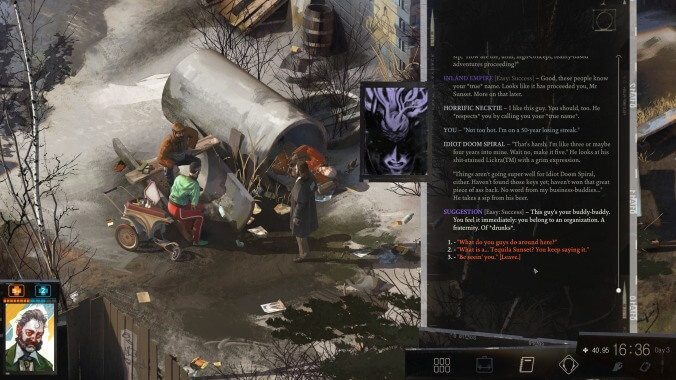Disco Elysium is the best unofficial Twin Peaks game ever made

Every Friday, A.V. Club staffers kick off our weekly open thread for the discussion of gaming plans and recent gaming glories, but of course, the real action is down in the comments, where we invite you to answer our eternal question: What Are You Playing This Weekend?
The corpse hangs hideous in front of me, so stinking from a week’s worth of cadaverine and neglect that it constitutes a Herculean manifestation of will simply not to vomit as I approach. I look up at his bloated features, searching for some meaning, some clue—not just to his murder, which looks to be deceptively simple, but to the whole holistic fuckedness of it all. “Speak to me, dead man,” I whisper into the cold fall wind. And then, with the lurching, awful inevitability of a nightmare, that’s exactly what he does.
I am a fan of detective games; the content of this column over the last year or so is testament enough to that. But I’ve never played a detective game quite like ZA/UM’s Disco Elysium, one as interested in delving the depths of one’s own inland empire as in the mechanics of interrogating suspects, and analyzing clues. The David Lynch allusion in the previous sentence is a deliberate one, by the way; it’s also the game’s own label for the Lynch-inspired skillset that lets you—for example—interrogate a corpse, a blending of imagination and the quasi-normal that might have a totally rational explanation—or might not. And while your playable detective in DE is a far cry from Dale Cooper’s clean-cut demeanor—wracked as he is with alcoholism, suicidal impulses, and a fashion sense fished out of a 1970s septic tank—he’s nevertheless the closest that the genre has ever come to offering up a satisfying emulation of Coop’s eclectic approach to calmly taking a mystery apart.
And yes, that includes Deadly Premonition. Where Access Games’ homage wears its Twin Peaks influences like a Halloween costume, Disco Elysium actually bothers to walk in its shoes; when my straight-laced partner (the inestimable Lt. Kim Kitsuragi) questions why we’re investigating a “curse” affecting a local business district (instead of the murder that’s actually our duty), and I can fire back “I believe that everything is connected,” it feels as satisfying as slurping down some damn fine coffee and apple pie. (It later turns out to be tangentially, sort of connected, so take that, rationality.) Later, I will suggest to Kim that even my amnesia—one of several plot elements the game shares with Planescape: Torment, another mystery of the strictly Paul Auster-type—is part of the overall process of existential detecting, that I have reinvented police work by destroying my own brain so thoroughly with booze and pills that all pre-conceived notions and false assumptions have been wiped away. (Neither Kim, nor I, are entirely clear on how full of shit this assertion actually is.)
Disco Elysium is a detective game for anyone who has ever wanted to solve a murder by starting an electronic dance club, or arguing with their own brain about the applicability of 30-year-old film trivia. You do a lot of brain-arguing, actually; each of your 20 skills is represented by a different voice in your head, suggesting or demanding you try different approaches to a problem. When they’re firing on all cylinders, it can make you feel like the smoothest superstar cop in existence; when they fail, you tend to act like an utterly unhinged loon. All of this is just a tiny part of this tremendously dense game, too, full as it is of political critiques, shockingly funny jokes, and richly drawn characters (both in and outside your own head). There’s a whole other essay to be written on the myriad ways the game sketches out Lt. Kitsuragi through his various reactions to your frequently deranged methods, from actual disapproval, to feigned disapproval, to those rare, wondrous moments when you actually get him to crack a smile. When a late-game skill-check listed “Kim *truly* trusts you” as one of its modifiers, it warmed my heart in a way no similar interaction in almost any other game of this type had. (Dang, I swore I’d try to get through this entire column without taking a swipe at The Outer Worlds. But hey, here we are.)
But for all that, Disco Elysium is also still a damn good mystery, one you can solve by embodying the methods of some of the greatest unconventional detectives of the modern era. For me, that meant channeling equal parts Dale Cooper, Dirk Gently, and Rust Cohle, but that’s by no means the only path; if you want to bust heads, do a Sherlock scan, or just be extremely high at all times, there’s a build, and a skill, that will seat itself happily on your shoulder, egging you on to glory. There are an astounding number of these interactions, and they’re somehow all written with humor, wit, and an absolutely breathtaking level of respect for what you, as a player, are trying (and, sometimes, failing), to do. The real mystery here is where the hell this thing came from. For a debut title from a new studio, and a writer who’s never worked in games before, it’s an astounding achievement—maybe even a masterpiece. If it’s not my pick for the best game of 2019, something damn good is going to have to come down the line in the next two months.